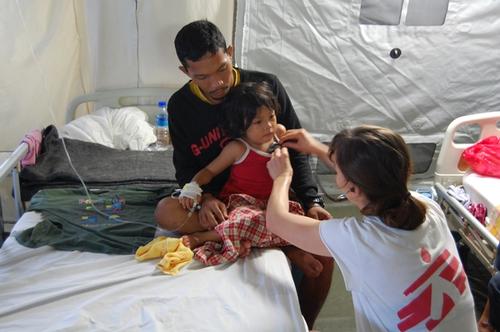Many children were among the victims of typhoon Haiyan, with one school in the Tacloban area of the Philippines losing 59 of its pupils. Médecins Sans Frontières (MSF) psychiatrist Frederique Drogoul describes a mental health programme that will target schoolchildren, mothers and other people struggling with serious psychological issues three months after the disaster, and provide them with specialised care.
“In the area around Tacloban, the typhoon was really strong. The tsunami-like wave rose up and flooded the stone buildings where people were sheltering, drowning many of them. People lost members of their family, especially children, because they couldn’t keep hold of them when the wave hit. They also lost their houses, and their means of earning a living – fishermen lost their boats, farmers lost their coconut trees. All the coastal communities were destroyed, and the people who survived lost everything, so many were left with major social and psychological issues.
Unexplained physical symptoms
Events of this magnitude affect everyone, and there was a lot of psychological distress as people struggled to deal with loss and bereavement. For the first few days, they were very shocked. In the following weeks, they came to health centres with unexplained physical symptoms, including dizziness, headaches and sleeping disorders, resulting from their psychological distress. Counsellors provided them with ‘psychological first aid’, by listening to them and getting across the message that their reactions were totally normal and would lessen over time.
After a month or two, most people began to recover – though they still felt sad, they were not ill. But five or ten percent of people didn’t recover. They continue to suffer heavily – with post-traumatic stress disorder, severe depression and sometimes with psychosis – and these are the people we want to target.
Existing psychiatric patients
We also need to be sure that existing psychiatric patients, who are very vulnerable, are able to continue their treatment, as many can no longer afford to pay for medication or even to travel to a clinic.
Providing support in schools is an important part of our programme. When the school in Palo reopened after the typhoon, 59 of its 300 pupils were missing. Our teams make weekly visits to the schools and support the teachers, helping them with their own suffering and helping them to manage the suffering of the children. Teachers refer the most severely affected children to our team, who provide group or individual sessions in school.
Anxious children
Since the typhoon, many children are anxious about being separated from their parents and have problems going to school. Once there, they may have difficulty concentrating, be very agitated, or else overly quiet and withdrawn.
The teachers help us identify children – and by extension whole families – who need specific psychological care, because when children cannot cope, often the whole family is unable to cope too.
Giving birth without a home
We only started ten days ago, but already our mental health teams in the schools are busy. They are also busy in the maternity ward of the hospital, with young mothers who don’t know how they are going to manage. Having a newborn to take care of can be very stressful, especially if your house has been destroyed and you lost other children to the typhoon.
Most people are Catholic, and live in small communities, so everyone knows each other. No one was unaffected by the typhoon, so they are all in the same situation, and there is an enormous sense of solidarity. But they are still very open to receiving outside support when it is needed. The more severe people’s troubles are, the less reluctant they and their families are to seek our help.
Working with community leaders
Community leaders and local health workers help us identify the most affected people – isolated old people, previously sick patients, families who are known to have lost many children. One man brought his wife to see us because, since seeing all the dead bodies in the streets, she couldn’t leave the house or do anything. Another young man was brought in totally delusional. Some people need medical treatment, but most just need psychological support and care.
I think it is a good and useful programme. Without MSF, they would not be able to get this kind of specialised care. There are social issues everywhere in the world but, after a disaster like this, it’s good to see that we can manage to be with these people for six or seven months. The consequences of this kind of disaster last for a long time, because people have had their way of life destroyed.”



